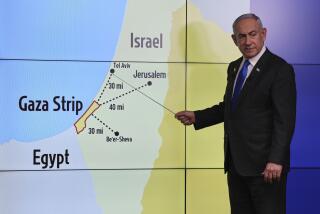Iran, Iraq Can’t Agree on Where to Draw the Line
- Share via
GENEVA — Iran insisted Friday that its southern border with Iraq follow the line drawn in a 1975 treaty, creating a potential impasse in talks aimed at ending the eight-year Persian Gulf War.
Delegations from the two countries met for three hours Friday evening, then adjourned until Sunday.
In a statement to the media earlier in the day, Foreign Minister Ali Akbar Velayati of Iran said the 1975 treaty, which establishes the border as the center of the waterway known as the Shatt al Arab, is an essential condition for reaching a “comprehensive, just and honorable peace.”
This puts the Iranian government in the position of basing its argument on a treaty signed by the man it deposed in 1979, the late Shah Mohammed Reza Pahlavi. And it takes the peace negotiations back to the very issue that caused the war, which began in 1980 when Iraqi troops invaded Iran in an effort to seize control of the waterway.
Don’t Expect Too Much
U.N. Secretary General Javier Perez de Cuellar, who is mediating the talks, cautioned reporters against expecting too much in the early stages of the talks.
“A problem that has lasted for centuries cannot be decided in an afternoon,” he said.
The talks began Thursday but lasted only two hours before the two sides withdrew to consult their respective governments. They met for more than three hours Friday before Perez de Cuellar announced that they had been adjourned until Sunday.
“Without being enthusiastic, I am rather encouraged,” he said.
The Shatt al Arab, which is formed by the confluence of the Tigris and Euphrates rivers, links Iraq’s only port, Basra, to the Persian Gulf. Control of it has been a source of friction between the two countries for decades, and in 1935, an international commission gave total control of it to Iraq.
Sharing Control
Under the terms of the 1975 treaty, signed by the Shah and Iraq’s President Saddam Hussein, Iraq agreed to share control, although Hussein said later that he signed the treaty only because his country was desperately weakened by its military campaigns against Kurdish rebels.
In exchange for rights to the waterway, the Shah agreed to stop assisting the Kurds and also to ask his allies, including the United States, to discontinue their aid to the Kurds.
But the treaty made Hussein vulnerable to domestic political attack, and when the Iranian revolution of 1979 weakened Iran’s armed forces, Hussein seized the opportunity to take back by force what he had let slip away by diplomacy.
In September, 1980, as his troops crossed into Iran, Hussein appeared on television and ripped up a copy of the treaty.
More to Read
Sign up for Essential California
The most important California stories and recommendations in your inbox every morning.
You may occasionally receive promotional content from the Los Angeles Times.













